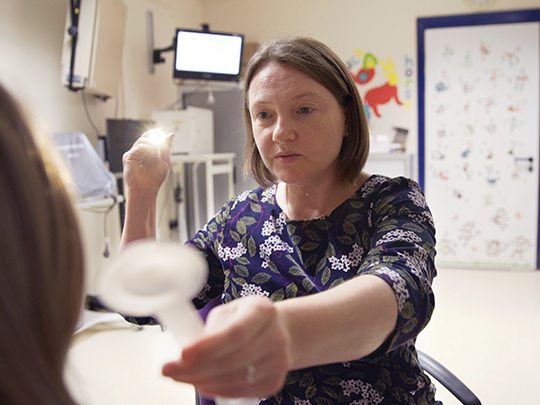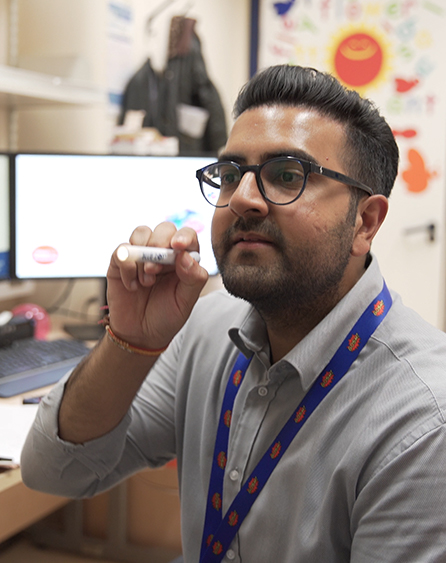
Bronwen, Orthoptist
Orthoptist
Orthoptists dramatically improve people’s vision. Working with a wider team of eye specialists, your role will be to understand the movement of the eyes and how they interact with the brain to create visual images. You’ll have the opportunity to really see the difference you’re making to your patients’ quality of life.
| Salary range | £24,000+ | |
| Hours | 37.5 hours a week | |
| Pattern | Shifts, with some evenings, nights and weekends |
![]() Orthoptics is a shortage specialism. Courses at English universities attract an additional £1,000 per year to study on top of the minimum £5,000 study grant. Learn more
Orthoptics is a shortage specialism. Courses at English universities attract an additional £1,000 per year to study on top of the minimum £5,000 study grant. Learn more
Role details
An Orthoptist plays a unique role in eyecare. You’ll diagnose and treat eye movement disorders, as well as visual impairments related to the way the eyes are interacting with the brain. This means you’ll even spot serious neurological conditions, such as multiple sclerosis and Parkinson’s.
The wide range of patients makes this a dynamic and decisive role, where one day you’re treating a toddler with a lazy eye, and the next, you’re the first person to identify a brain tumour.
Collaborating in a team of eye specialists, you’ll be with patients every day, seeing directly the change in their quality of life when you treat their double vision or manage their squint.
Your role could involve assessing the vision of babies, or helping patients who have suffered a stroke. You’ll have the opportunity to work in a variety of places, from hospitals to schools.
Qualities needed

You’re comfortable dealing with people and children.

A good communicator, able to explain conditions and treatments.

Good decision-making skills and attention to detail for diagnosing and treating.

Organised, with the ability to plan and look ahead.
“It’s nice to see the improvement from visit to visit.”
Roopen, Orthoptist
What makes being an Orthoptist special?

It’s a dynamic and challenging role where you can see the improvement you make to the quality of people’s lives.

You’ll get to work with a wide range of patients every day.

As part of a wider team of eyecare specialists, you’ll investigate, diagnose and treat abnormalities of eye movement, as well as defects of binocular vision.

You’ll be the first to detect neurological conditions, such as brain tumours and multiple sclerosis.
How to become an Orthoptist
To become an Orthoptist, you must first successfully complete an approved degree in orthoptics from one of the three universities in the UK which offer the course.
Duration
3-4 years full-time
Once you’ve successfully completed your degree you must register with The Health and Care Professions Council (HCPC) before you can start practicing.
Entry requirements
- Two or three A levels, including a science
- Five GCSEs (grades A-C), including English language, maths and science (Each institution sets its own entry requirements, so it’s important to check with them.)
- Equivalent qualifications:
- A BTEC, HND or HNC which includes science
- A relevant NVQ.
- A science-based access course
- Equivalent Scottish or Irish qualifications
Application period
There are opportunities to apply throughout the year, with September through to January being the busiest months. During February to October, UCAS Extra and Clearing applications are open, where universities look to fill in any course vacancies.
Keep in mind that individual universities may also set their own deadlines during this period.
Find an Orthoptics degree using the UCAS Course Finder
You’ll need to apply for an apprentice position with a healthcare provider.
You’ll be expected to have some relevant experience, either voluntary or paid. For example, working as an emergency care assistant or volunteering with St John Ambulance or the British Red Cross. You must also hold a full, manual driving licence when you apply.
Apprenticeships offer the opportunity to earn while gaining a qualification. Your employer and the government will pay the tuition fees for your apprenticeship, meaning apprenticeships are not eligible for student finance.
Vacancies can be found on the NHS Jobs website and Find an Apprenticeship website
and Find an Apprenticeship website

Roopen, Orthoptist
